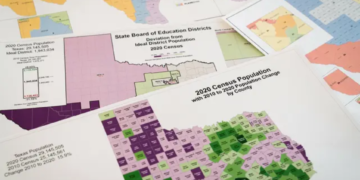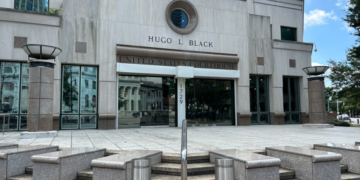Oct 18, 2024 Story by: Editor
With less than a month before the election and 10 days until Nebraska’s final voter registration deadline, the state Supreme Court has ordered election officials to allow citizens who have completed their felony sentences to register to vote. This ruling, issued on Wednesday, impacts tens of thousands of Nebraskans who regained the right to vote under laws passed by the legislature in 2005 and updated in July 2024, but who were previously barred from registering by the Secretary of State.
This decision leaves voting rights advocates with just days to inform and mobilize tens of thousands of eligible voters, many of whom live in Nebraska’s Second Congressional District, which includes Omaha—a critical battleground in both presidential and congressional elections.
In 48 states, American citizens lose their right to vote when convicted of a felony, but the duration varies depending on the state. In recent years, there have been increasing efforts to reform disenfranchisement laws, which are considered remnants of the Jim Crow era, through gubernatorial action, citizen-backed constitutional amendments, or legislative changes.
However, these reforms often face resistance from lawmakers and other officials, who attempt to limit or reverse their impact.
Nebraska is one such state that has expanded voting rights for people with felony convictions, despite opposition from its own Attorney General and Secretary of State. The legal debate in Nebraska centered on whether the legislature had the authority to restore voting rights or if that power rested solely with the executive branch’s pardons board. The issue arose after the Nebraska legislature passed a law in April 2024, which restored voting rights immediately after a felony sentence was completed, eliminating the previous two-year waiting period imposed by the 2005 law.
Two days before the new law was set to take effect in July 2024, the state Attorney General issued an advisory opinion declaring that both the 2005 and 2024 laws violated the Nebraska Constitution, arguing that only the pardons board had the authority to reinstate voting rights. While the Attorney General’s opinion was nonbinding, Nebraska Secretary of State Bob Evnen instructed election officials to stop registering individuals with felony convictions unless the pardons board had restored their voting rights.
In response, the American Civil Liberties Union (ACLU) of Nebraska filed a lawsuit on behalf of three plaintiffs and a nonprofit group, urging the state Supreme Court to compel the Secretary of State to follow the law. Evnen, however, echoed the Attorney General’s stance, arguing that the laws were unconstitutional and that the Nebraska Constitution required individuals to be “restored to civil rights” (in the plural) before regaining their right to vote. He contended that the laws only restored one right—the right to vote.
In the case Spung v. Evnen, the Nebraska Supreme Court did not directly address the constitutionality of the laws. Instead, it ordered election officials to allow individuals who had completed their felony sentences to register to vote, noting that the laws would stand because “the requisite number of judges have not found that the statutory amendments are unconstitutional.” Two justices dissented, agreeing with Evnen and the Attorney General that only the pardons board should have the power to restore voting rights.
Chief Justice Michael Heavican, who is set to retire at the end of the month, wrote a concurring opinion that highlighted the limited time between the court’s receipt of the case and the upcoming election deadlines. Nebraskans who wish to register online must do so by October 18, and the final in-person registration deadline is October 25.
Nebraskans with felony convictions are not the only ones facing uncertainty regarding their voting rights. In August 2024, the Minnesota Supreme Court issued a ruling affecting over 50,000 individuals with felony convictions in that state. Similar to Nebraska, the Minnesota Constitution requires individuals to be “restored to civil rights” before they can vote. In 2023, the court ruled that such restoration could come through legislative action or an official pardon.
Despite this ruling, a 2023 law that restored voting rights to non-incarcerated individuals convicted of felonies faced a legal challenge from an “election integrity” group. However, the Minnesota Supreme Court upheld the law in August, ruling that the plaintiffs lacked standing to sue because they were not directly harmed by the law and could not rely on taxpayer standing to challenge it.
These rulings in Nebraska and Minnesota offer clarity to thousands of voters about their eligibility to participate in the 2024 election. However, with Election Day fast approaching, many may still miss the opportunity to exercise their restored voting rights.
Patrick Berry, counsel in the Brennan Center’s Democracy Program, commented on the importance of these rulings, noting that they provide “certainty to tens of thousands of citizens across Nebraska and Minnesota about their right to participate in the 2024 election.” Source: State Court Report

















